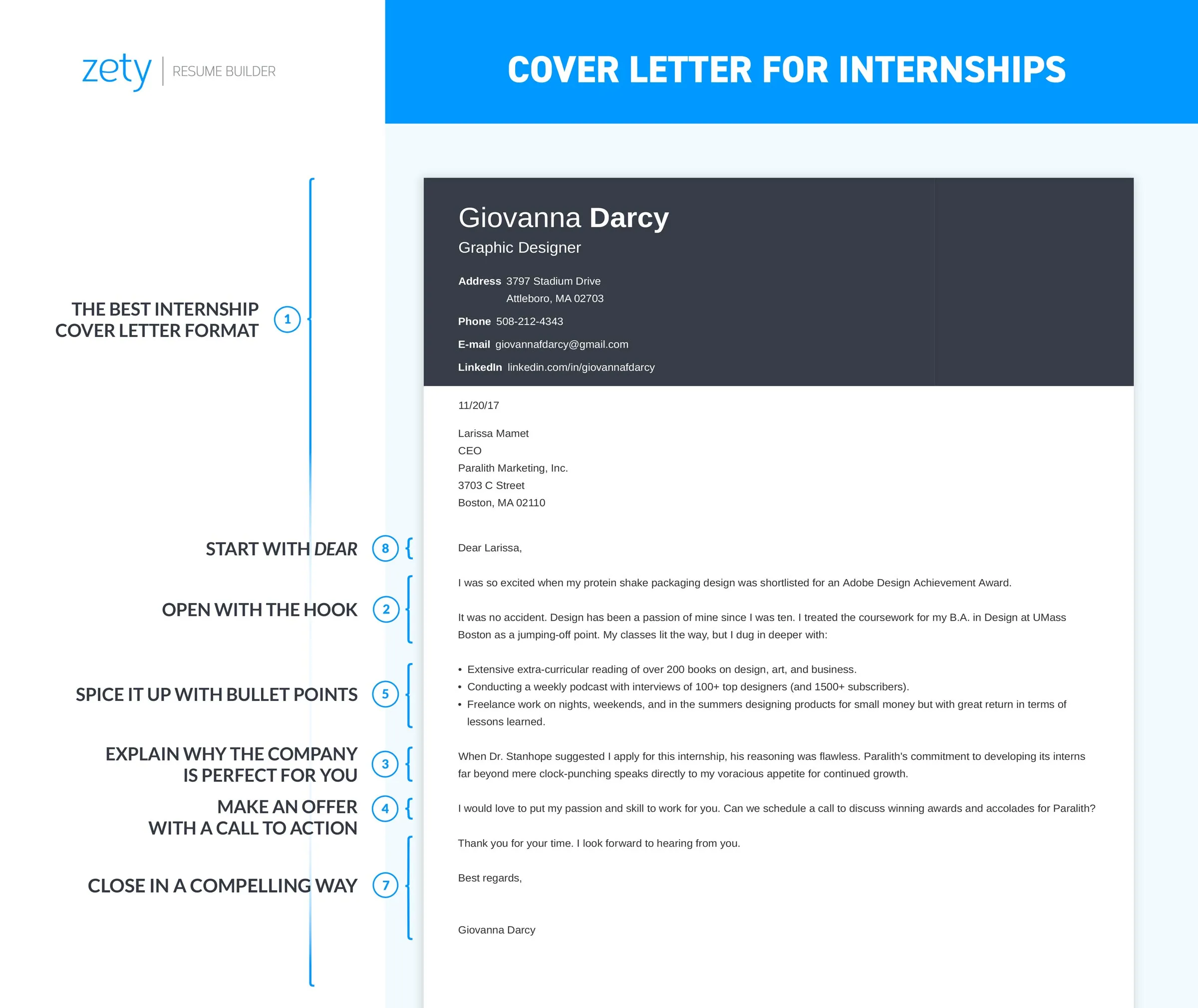Understanding the Importance of a Journalism Internship Cover Letter
A well-crafted cover letter is your first opportunity to make a strong impression on potential employers in the competitive field of journalism. It serves as a crucial introduction, going beyond your resume to showcase your personality, passion, and specific qualifications for a journalism internship. In a world where countless applicants vie for limited positions, a compelling cover letter is essential for grabbing the attention of hiring managers. It’s your chance to articulate your unique value proposition and demonstrate why you are the ideal candidate. This document allows you to elaborate on your skills, experiences, and enthusiasm in a way that a resume alone cannot achieve. It is an essential tool to open doors and get that all-important interview.
Key Components of a Strong Journalism Internship Cover Letter
Several key elements contribute to a standout journalism internship cover letter. These include clear and concise contact information, a personalized greeting, a captivating opening paragraph that immediately grabs the reader’s attention, and a well-structured body that highlights your relevant skills, experiences, and passion for journalism. It is also important to demonstrate knowledge of the specific publication or organization you’re applying to. Each component should be carefully crafted to convey your enthusiasm, professionalism, and suitability for the role. Remember to tailor your letter to the specific internship and organization you’re applying for, showcasing how your unique skills and experiences align with their needs.
Your Contact Information and the Date
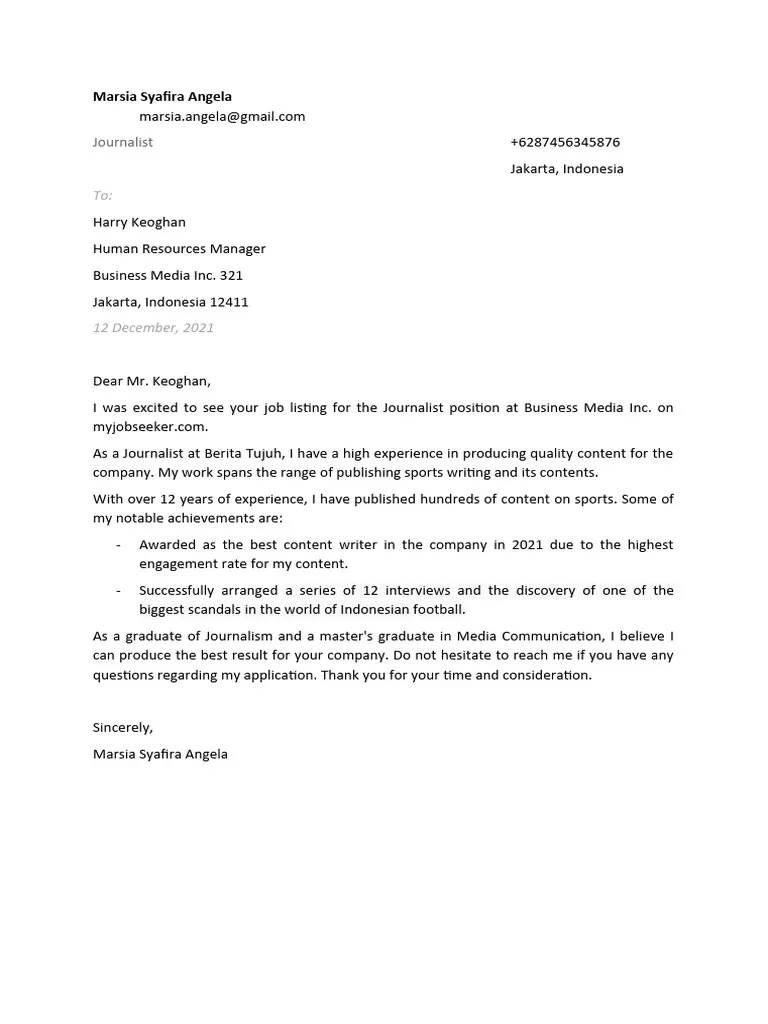
Begin your cover letter by providing your full name, phone number, email address, and LinkedIn profile URL (if applicable) in the upper-left corner of the document. Immediately below this, include the current date. This section is crucial for easy communication and establishes a professional tone from the outset. Make sure your contact information is accurate and up-to-date. Also, ensure your email address is professional and appropriate. The date is important as it establishes when you submitted the letter and shows you are on top of things and organized. This meticulous approach indicates your attention to detail, which is a valuable asset in journalism.
The Hiring Manager’s Name and Title
Addressing your cover letter to a specific person significantly increases your chances of getting noticed. Research the hiring manager’s name, title, and the correct spelling by visiting the publication’s website or checking LinkedIn. If the name is available, start the letter with ‘Dear Mr./Ms./Mx. [Last Name].’ If the name is unavailable, it is acceptable to use ‘Dear Hiring Manager’ or ‘Dear [Department Name] Team.’ Personalizing your letter demonstrates that you have taken the time to research the organization and care about the role. This proactive approach sets you apart from generic applicants and shows that you’re genuinely interested in the specific opportunity and have the attention to detail needed for good journalism.
A Compelling Opening Paragraph
Your opening paragraph is your first chance to make a strong impression. Start by clearly stating the position you are applying for and how you learned about it. Immediately capture the reader’s attention by expressing your genuine interest in the internship. Consider including a brief, impactful sentence highlighting your most relevant skill or experience. For example, you might mention a specific project or publication that demonstrates your abilities. Avoid generic opening lines. Make the reader want to continue reading. This paragraph is your hook. It should be engaging and demonstrate your understanding of the role and the publication’s values.
Highlighting Your Relevant Skills and Experience
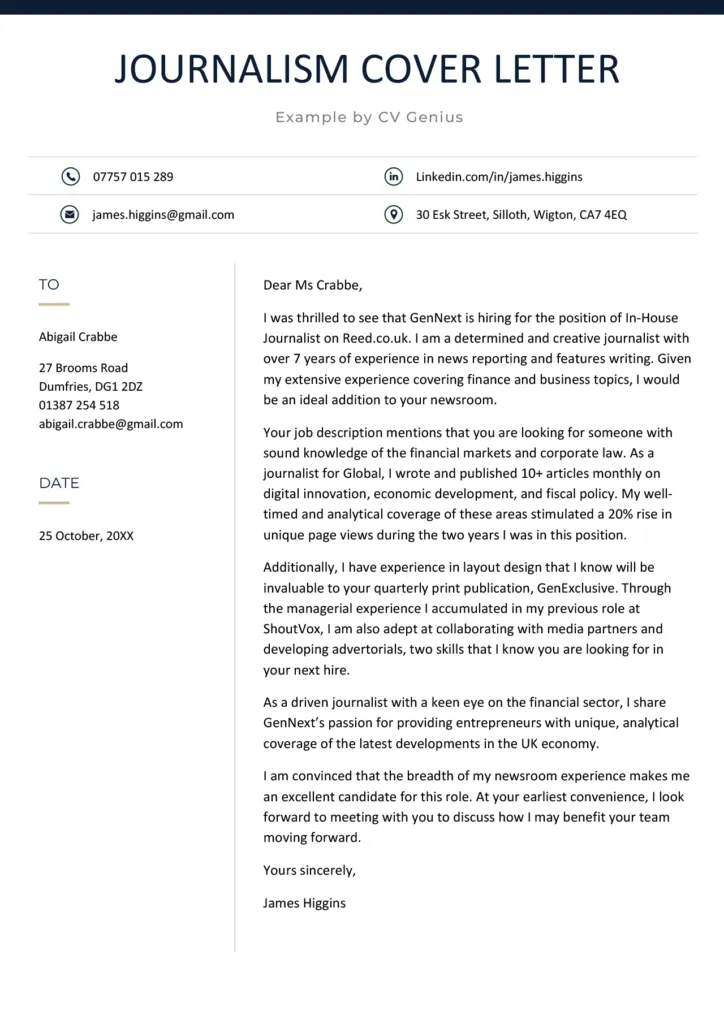
The body of your cover letter is where you showcase your skills and experience. Focus on the aspects most relevant to the internship. Use specific examples to illustrate your abilities, rather than simply listing them. Quantify your achievements whenever possible. For instance, instead of saying ‘I wrote articles,’ say ‘I wrote and published over 15 articles, resulting in a 20% increase in readership.’ Mention any coursework, projects, or previous experiences (even if unrelated to journalism) that demonstrate your skills. This could include writing, research, communication, or critical thinking. Provide concrete evidence that supports your claims. Make your qualifications undeniable.
Showcasing Your Passion for Journalism
Journalism requires passion and enthusiasm, so make sure your cover letter reflects it. Describe your interest in the field and why you are drawn to journalism. Explain what motivates you and what type of stories you’re interested in covering. Express your understanding of the publication’s values and mission. Show how your interests align with their coverage. Demonstrate your knowledge of current events and the media landscape. Mention specific journalists or publications that inspire you. Passion can be the key differentiating factor. Let your enthusiasm for the profession shine through, showing that you are excited to contribute to the field.
Mentioning Specific Publications or Organizations
Demonstrating your knowledge of the publication or organization is essential. Research their work, readership, and areas of focus. Mention specific articles, projects, or initiatives that resonate with you and explain why. Show that you understand the publication’s voice and target audience. Tailor your letter to match their style and values. This demonstrates that you have put in the effort to learn about the organization and are serious about working there. This research will make your letter more compelling and increase your chances of getting noticed. Generic cover letters are easy to spot and immediately disregarded.
Expressing Your Enthusiasm and Goals
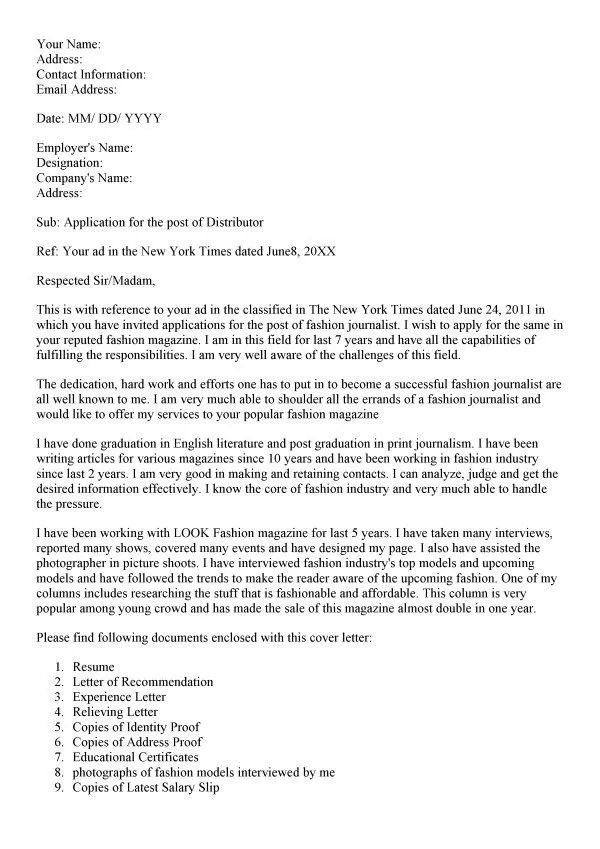
Clearly state your goals for the internship and how you hope to grow as a journalist. Explain what you hope to learn and what you hope to achieve during the internship period. Express your eagerness to contribute to the team and the publication. Convey your enthusiasm for the opportunity to work with experienced professionals. This demonstrates your proactive attitude and your desire to learn and grow. It assures the employer that you are not just looking for an internship, but a genuine learning experience. Show that you are a goal-oriented individual with a clear vision for your career in journalism.
Structuring Your Cover Letter Effectively
Ensure your cover letter is well-structured and easy to read. Use clear and concise language, with short paragraphs and plenty of white space. Break down your content into logical sections, such as introduction, skills and experience, passion for journalism, and goals. Use bullet points to highlight key accomplishments or skills. Make sure your letter flows smoothly from one point to the next. Avoid jargon and overly complex sentences. A well-structured cover letter is a reflection of your organizational skills and ability to communicate clearly, important qualities for any journalist.
Formatting Your Cover Letter for Readability
Formatting plays a vital role in readability. Choose a professional font, such as Times New Roman, Arial, or Calibri, in a standard size (11 or 12 points). Use consistent formatting throughout your letter. Keep your margins at one inch on all sides. Use single spacing within paragraphs and double spacing between paragraphs. Left-align your text, making it easy for the reader to follow. Ensure your cover letter is visually appealing and free of clutter. A well-formatted letter shows that you value clarity and professionalism.
Proofreading and Editing Your Cover Letter
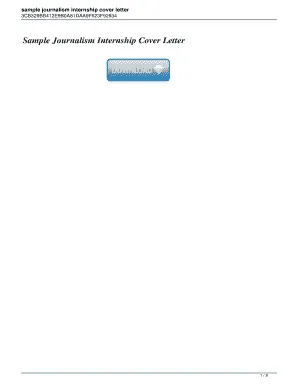
Proofreading and editing are critical steps. Always proofread your cover letter meticulously for any grammatical errors, typos, or spelling mistakes. Read your letter aloud to catch any awkward phrasing or sentence structure issues. Ask a friend, family member, or career advisor to review your letter for feedback. Ensure your language is clear, concise, and professional. Errors can create a negative impression and indicate a lack of attention to detail. A polished and error-free cover letter will show your professionalism and boost your chances of success.
Examples of Strong Action Verbs for Journalism Cover Letters
Using strong action verbs can make your cover letter more impactful. These verbs demonstrate your skills and achievements in an active and engaging way. Some examples include ‘researched,’ ‘wrote,’ ’edited,’ ‘investigated,’ ‘reported,’ ‘interviewed,’ ‘analyzed,’ ‘published,’ ‘created,’ ‘developed,’ ‘managed,’ ‘collaborated,’ ‘presented,’ and ‘communicated.’ By using these words, you create a more dynamic and compelling narrative. Incorporate these verbs naturally within your descriptions of your experience and skills. This will transform your cover letter into a captivating read.
Common Mistakes to Avoid in Your Cover Letter
Avoid common mistakes that can hurt your chances. Do not use generic or overly formal language. Avoid repeating information that is already in your resume. Never submit a cover letter with spelling or grammatical errors. Do not be negative or critical of previous employers or experiences. Avoid making claims you cannot support. Never use clichés or overused phrases. Do not exceed the recommended length of one page. Avoid the use of jargon. Make sure to tailor your cover letter to each specific job, rather than using a generic template.
Tailoring Your Cover Letter to the Specific Internship
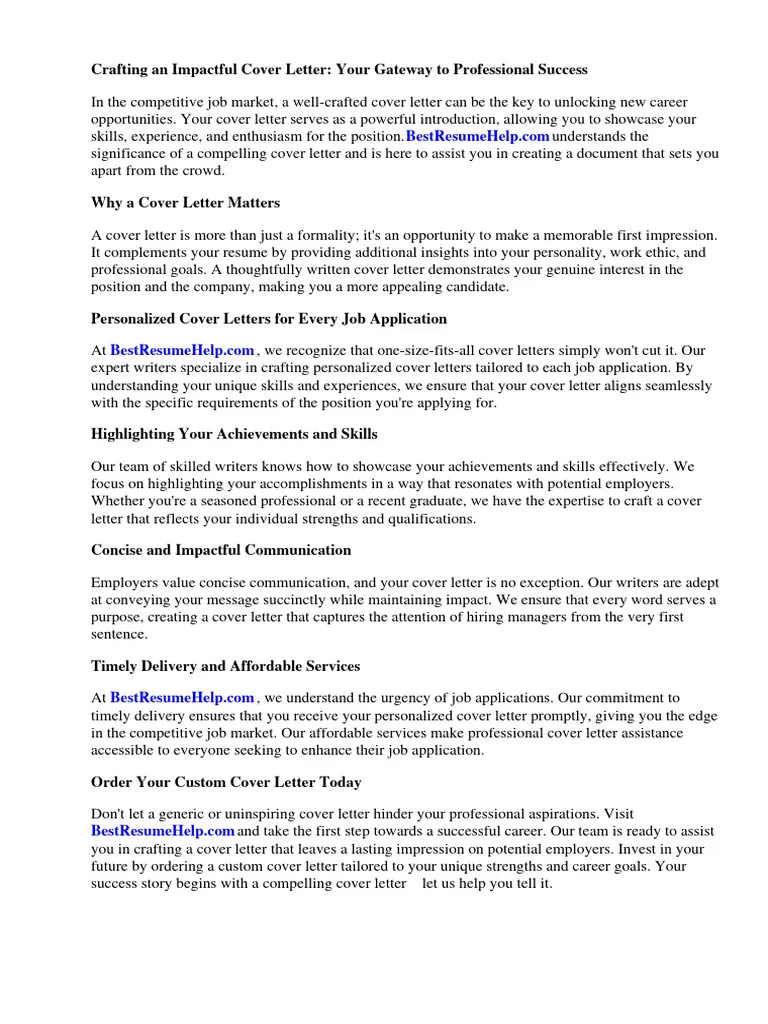
One of the most important steps is to tailor your cover letter to each specific internship. Each publication or organization has its unique mission, values, and focus. Research the specific internship and company. Show that you understand what they are looking for. Customize your letter by highlighting the skills and experiences that align with their requirements. Mention specific projects or initiatives that the organization has been involved in, and explain how your skills could contribute to their success. This level of personalization demonstrates that you care about the role and are not just sending out mass applications.
Writing a Memorable Closing Paragraph
Your closing paragraph is another opportunity to leave a lasting impression. Reiterate your enthusiasm for the internship and your key qualifications. Thank the hiring manager for their time and consideration. Express your availability for an interview and provide your contact information one last time. Make sure to end with a professional closing, such as ‘Sincerely’ or ‘Best regards,’ followed by your full name. A strong closing paragraph reinforces your key points and leaves the reader with a positive final impression.
Following Up After Submitting Your Cover Letter
After submitting your cover letter, follow up with the hiring manager or the relevant contact person. Send a brief email or make a phone call one to two weeks after submitting your application to inquire about the status of your application. Express your continued interest in the position. Be polite and professional. Do not be overly persistent, but a follow-up shows initiative and interest. This helps you stay top of mind and demonstrates your commitment to securing the internship. Following up can make all the difference. Good luck with your journalism internship search!
